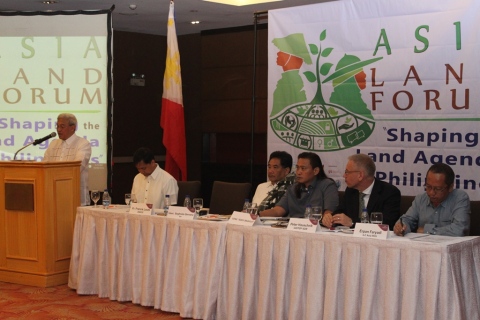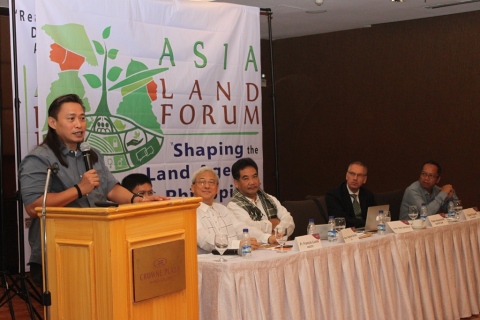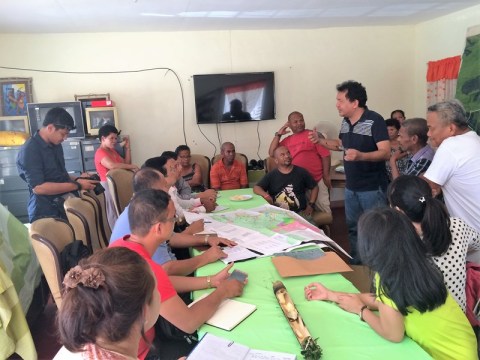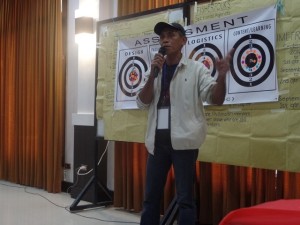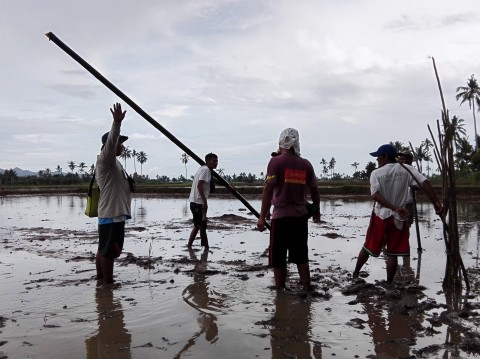Category Archives: Land Rights
Asia Land Forum: Shaping land agenda and defining land rights to achieve food sovereignty
The Asia Land Forum was held on 5 September 2016 in Ortigas Center, Quezon City, Philippines. Divided into two parts, the Forum engaged the Philippine Government on the proposed legislative land agenda of the CSO members of the International Land Coalition (ILC), and provided space for knowledge exchanges on achieving food sovereignty through advancing land rights. Around 85 participants from the Governments of Philippines, Nepal, and Cambodia; intergovernmental organizations (ADB, FAO, IFAD, WB); CSO representatives from Bangladesh, Cambodia, India, Indonesia, Kazakhstan, Kyrgyz Republic, Mongolia, Nepal, Pakistan, Philippines and Thailand took part in the discussion.
The morning session on “Shaping the Land Agenda in the Philippines” pressed on the land agenda for the Duterte Adiministration under the framework of land rights as human rights. Philippine CSO members of ILC demanded for the passage of the (i) Completion of Notice of Coverage Bill or the NOC Bill, (ii) Indigenous Community Conservation Area (ICCA) Bill, and (iii) the National Land Use Act (NLUA) Bill, collectively called as the “Triple Land Rights Bills,” to effectively address land rights issues that affects the lives of marginalized sectors such as indigenous peoples, farmers and fisher folks as well as the urban poor communities.
Wilson Requez of the People’s Campaign for Agrarian Reform Network, Inc. (AR Now!) discussed that more than 69,000 hectares (ha) of landholdings are yet to be covered for redistribution (DAR Status Report, 2016) under the Comprehensive Agrarian Reform Program (CARP). With the failure to pass the NOC Bill on completing the land acquisition and distribution provision of the CARP during the 16th Congress, it is hoped that in this 17th Congress, the Bill will be passed as the legislative champions for agrarian reforms both in the Lower and Upper Housed have already filed bills for the Completion of Notice of Coverage and are hoping to sustain the momentum it gained during the 16th Congress.
Dave de Vera of the Philippine Association for Intercultural Development (PAFID) highlighted the importance of ICCAs in conserving indigenous people (IP)’s lives and source of livelihood leading to biodiversity conservation. Hence, the passage of the ICCA Bill will further strengthen the mandate of the Indigenous Peoples’ Rights Act (IPRA) and will highlight the very important role of IPs in the conservation of our remaining resources.
Lastly, Elmer Mercado, EnP of the Campaign for Land Use Policy Now! (CLUP Now!) stressed that a clear land use policy through the NLUA should be passed to rationalize the use of lands and address the current degradation of country’s land resources.
Representative Teddy Baguilat committed to support the passage of these Bills in the current Congress.
During the afternoon session on “Realizing the sustainable development goals: Defending land rights of communities to achieve food sovereignty in the region,” participants discussed the food security priorities of international organizations and selected Asian countries and sustainable development goals in the context of hunger and land rights.
Fifty-two representatives of grassroots organizations, peoples’ movements and CSOs from 10 Asian countries signed the Quezon City Declaration on Food Sovereignty calling upon concerned States, institutions, and corporations to respect and adhere to the 12 principles of the Declaration on protecting and strengthening land rights towards food sovereignty. See Declaration here.
The Asian NGO Coalition for Agrarian Reform and Rural Development (ANGOC), the International Land Coalition (ILC), the GIZ, and the Philippine Development Forum-Working Group on Sustainable Rural Development Forum (PDF-SRD), in partnership with AFA, AR NOW!, CARRD, PAKISAMA, PAFID, TFM and XSF organized this event.
Cambodian CSOs visit the Philippines
To learn about the land and housing laws, and the strategies of the CSO in ensuring the access of resource rights among the sectors, the NGO Forum on Cambodia (NGOF) organized the Learning Visit on Land and Housing Rights in the Philippines on 26-28 July 2016. Representatives from Sahmakum Teang Tnaut (STT), Focus on the Global South, Equitable Cambodia (EC), and Community Legal Education Center (CLEC), and ADHOC Cambodia also took part in the study tour.
Hosted by ANGOC, the first day focused on the Philippine land laws and the strategies and experiences of CSOs in pursuing their advocacies on agrarian reform and land use. While Philippines has many asset reform laws rooting to the Philippine Constitution of 1987, they are highly sectoral in approach; thus overlapping provisions and jurisdictions persist in the country resulting to resource conflicts among different sectors. Hence, the Philippine CSOs push for the passage of the National Land Use Act (NLUA) Bill. CSOs and advocacy groups who presented their advocacy experiences were The People’s Campaign for Agrarian Reform Network Incorporated (AR Now!), Center for Agrarian Reform and Rural Development (CARRD), and Campaign for Land Use Policy Now! (CLUP Now!).
On the second day, Cambodian CSOs visited the Community Organizers Multiversity (COM) office to hear about the Urban Development and Housing Act (UDHA) as the main Philippine law on urban housing. They have also learned the initiatives COM conducts to ensure proper implementation of the said law. They have visited a site where an urban housing project is being implemented in Manggahan, Pasig City to learn the experiences and struggles of the Alliance of People’s Organization along Manggahan Floodway Pasig (APOAMF) in successfully fighting for their right to live within city through a near-city housing relocation site project which they, themselves, have developed and proposed to the Government.
Lastly, the Cambodian CSOs visited and learned from the Pastolan indigenous community in Hermosa, Bataan, who have successfully claimed their ancestral domain title with the support of the Philippine Association for Intercultural Development (PAFID). Visitors have also learned how the government and the indigenous community have sustained a harmonious relationship to one another in a dialogue with the Subic Bay Metropolitan Authority (SBMA).
Philippines: Lands that farmers can finally call their own
We are posting this story shared by Kaunlaran ng Kanayunan at Repormang Pansakahan (KAISAHAN).
After 20 years of land acquisition struggles, 23 farmer beneficiaries in Barangays Sumanga and Valenciana in Ormoc City, Leyte have been successfully installed to the lands they have long been awarded with certificates of land ownership (CLOA).
The Department of Agrarian Reform (DAR) led the installation on 20 and 21 June 2016 in the two villages together with some 300 officials and representatives from the Philippine National Police (PNP), Commission on Human Rights (CHR), and other advocacy groups including KAISAHAN.
This long-time story of unsecured land tenure of farmers roots to landowners’ resistance to the redistribution. Whenever installation is attempted, farmers receive threats and intimidation from the previous landowners, Larrazabal, resulting to repeated failures of the process. The last time was on 9 February 2016.
Even up to the day of this event, previous landowners have been continuously resisting. KAISAHAN Executive Director Anthony Marzan and legal officer Atty. Claire Demaisip reiterated to the opposing party that only a temporary restraining order from the Supreme Court can postpone the instalment.
To secure the post-installation situation, KAISAHAN has insisted of putting up a PNP detachment until the peace and order in the area is assured. Farmer groups and federations in the areas have also assured that they will provide support services to the new farmer-landowners to ensure sustainable use of their lands.
Land rights activists in Nepal receive land certificates
We are posting this news shared by the Community Self-Reliance Centre (CSRC).
After more than a decade of land rights movements, 27 members of the Rajdevi Village Land Rights Forum (VLRF) in the municipality of Lahan, and 273 families from Bastipur in Siraha District have awarded with Village Block Land Certificates.
The distribution only started this April 2016 after delegations from Siraha VLRF and District Land Rights Forum (DLRF) went to the District Land Revenue Office on March 2016 to demand for their rights.
“Now, [only] we are assured that we will not be evicted from the land we are residing for generation,” says a new Village Block landowner.
17th Annual World Bank Conference focuses on land and poverty

The panel of the 17th World Bank Conference. Photo by Nataliya Makarenko. Photo retrieved from the World Bank Website.
On 14-18 March 2016, government, CSOs, academe, the development community, and the private sector gathered at the Annual World Bank Conference on Land and Poverty to discuss land policy design and implementation, impact evaluation and progress monitoring, and the latest researches on these issues.
Held at the World Bank Headquarters in Washington D.C., the theme was Scaling up Responsible Land Governance. On its 17th year, the conference paid specific attention to working at scale, mainstreaming innovations and sustaining investments in land governance. Participants discussed strategies on inclusiveness, sustainability, reliability, and on how better land formation and more tenure security can contribute to the objectives and progress towards the Sustainable Development Goals.
ANGOC being a member of the Steering Committee of the World Bank project on Enabling the Business of Agriculture, ANGOC Chair Emeritus Fr. Francis Lucas chaired the session on Addressing Land Related Corruption.
One of the issues raised was on corruption on land access particularly on its impacts to women. Participants pointed out that continuous dialogues among CSOs, corruption victims, and Government should take place to come up with policies to eliminate corruption on land.
Conference agenda and presentations can be downloaded here.
Land installation to agrarian reform beneficiaries in Leyte, Philippines: stalled!
We are posting this news shared by Solidarity Towards Agrarian Reform and Rural Development (KAISAHAN).
The Department of Agrarian Reform (DAR) Office of Leyte announced postponement of land installations in Barangays Valencia and Sumanga in Ormoc, Leyte on 9 February 2016 affecting around 30 agrarian reform beneficiaries (ARBs).
DAR recalled its own writ of installation allegedly due to a filed case of cancellation of Certificate of Land Ownership and Acquisition (CLOA) over the land by other farmers. Provincial Agrarian Reform Program Officer (PARPO) II Renato Badilla sent orders stating that previous landowners, Tan Landholdings and the Potenciano & Anecita Larrazabal Enterprises Corporation (PALEC) opposed the installations in the 30 and 35 hectares of land in the two barangays due to the alleged erroneous coverage of the subject landholdings.
Together with the farmers, KAISAHAN expressed their frustration to the non-installment. Atty. Claire Demaisip of KAISAHAN pointed out that “EXCEPT FOR THE SUPREME COURT, no court in the Philippines shall have jurisdiction to issue any restraining order or writ of preliminary injunction against the PARC [Presidential Agrarian Reform Council], the DAR, or any of its duly authorized or designated agencies in any case, dispute or controversy arising from, necessary to, or in connection with the application, implementation, enforcement, or interpretation of (the AR laws).” “It is clearly stated that only a TRO [temporary restraining order] from the Supreme Court can stop this installation,” adds Atty. Rolly Poero, also from KAISAHAN.
In a meeting following the release of the Orders, the farmer beneficiaries wielded their CLOAs before DAR and Municipal Agrarian Reform Officer (MARO) representatives with Leyte Sheriff Joseph Catingub and demanded the immediate resolution of this case and their installation. However their response was that as much as they wanted to install the farmers, they are not in the position to resolve the issue. They can only write their appeals to the PARO’s Orders.
The said farmer beneficiaries from Valencia and Sumanga have already had several attempts for installation since they received their CLOAs way back in 1996. However, all these attempts failed due to resistance of the previous landowners.
5000 landless people protest for their homestead land rights
We are sharing this news posted by Ekta Parishad on 17 March 2016.
After years of Ekta Parishad’s campaigning and conducting mass mobilizations for land rights, the National Rural Homestead Bill was drafted in 2013 to ensure that rural families have the right to a home and a piece of land not less than 10 cents (0.04 hectares). Despite repeated promises from the government to prioritize its passage, the Bill has never been presented in the parliament.
On 14-15 March 2016, Ekta Parishad once again gathered more than 5,000 India’s landless people in Jantar Mantar, New Delhi to demand for their homestead land rights.
From these series of activities, Ekta Parishad asserted that movements for land rights need new form – improving the culture of protest to ensure that demands of people are heard; and the culture of governance to guarantee government’s actions from their promises.
Arippa people: “We need lands for agriculture!”
Around 3000 Arippa indigenous people (IP) and landless poor in India started a hunger strike in front of the Kerala Secretariat on 19 February 2016 to protest for their land rights which they have been demanding since 2013. Ekta Parishad joined the 15-day protest.
Tribes claim the 55.46 acres of a 90-acre land in the Arippa forest in Kulathuphuza village to be a surplus land meant for redistribution among the landless poor. The Kerala Government, however, allotted this for developing universities and campuses apart from the 68.46 acres allocated for institutional developments (George, 2014).
In 2013, the Kerala Government has enacted the “Zero Landless Program” awarding titles of 3-cent lands (equivalent to 0.01 hectare) to the IPs and landless poor for dwelling. This amount of plot barely provides sustenance to the families. They need lands for agriculture.
For three years, these activists have been conducting mass mobilizations for their land rights; and the Government has been deaf of these people’s pleas.
In a news story posted on 20 February 2016, an action was finally heard from the Government. Chief Minister Oommen Chandy has directed the District Collector to furnish details of the Arippa families to whom he promised to give lands upon availability.
Training on Gender Equity and Women’s Access to Land
We are posting this update shared by the Association for Land Reform and Development (ALRD).
ALRD conducted a training on “Gender Equality and Women’s Access to Land” on 16-21 January 2016 in Dhaka with 25 participants from 13 different partner organizations (11 were women). The five-day-training course was to raise awareness to the partner organizations and their beneficiaries on equal rights of women on land and other natural resources, and on elimination of all forms of discrimination and violence against women.
Ensuring women’s equal rights to land are hindered by gender-blind development policies of the government resulting to land-related violence among women. This training helped the participants to identify the loopholes of the existing legal instruments and practices of multi-dimensional discriminations and violence against women in the society. Although the Constitution of Bangladesh recognizes equal rights for women, several laws-policies and socio-cultural context of the country ignores women’s equal rights in all aspects of life. Through the discussions in the training, participants realized the need to further develop existing laws as well as social patriarchal mind-set to prevent discriminatory practices against women.
Participants committed to disseminate the lessons learned to the beneficiaries and stakeholders in their respective working areas. They will also undertake mobilization activities for creating movements in the local level.


